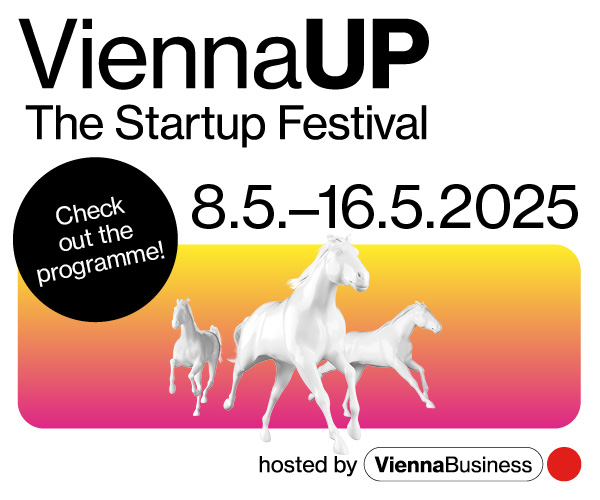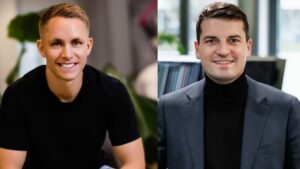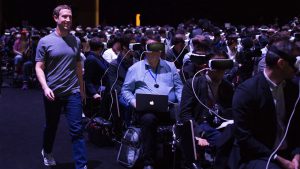The Big Reset: Sustainable Social Innovation Beyond NGOs and Grants – fireside chat with Nancy Schiller, America for Bulgaria Foundation
In this fireside chat with Nancy Schiller, CEO and President of America for Bulgaria Foundation, editorial lead of Trending Topics Alexandra Kozbunarova is looking into the models for sustainable social innovation and entrepreneurship beyond the NGO and grants stereotypes.
Nancy Schiller, currently CEO and President of America for Bulgaria Foundation, has served as a Managing Director of the Bulgarian-American Enterprise Fund for 21 years and has seen the local business and social environment evolve.
The talk was part of the online conference The Big Reset: From a Crisis Mode To Entrepreneurial Mindset, organized by Trending Topics SEE. The main question of the conference was: could the current crisis be an opportunity for development? For four days, entrepreneurs, leaders, experts, community builders, and policy-makers will discuss and explore opportunities in various digital formats.
Trending Topics: You have been observing the development of the local economy and society for more than 20 years. Could you briefly share your story with Bulgaria?
Nancy Schiller: It has been a long journey. Actually, it has been 28 years since my very first trip to Bulgaria. It was April of 1992. A lot of changes I have seen over the years. I have now the pleasure of living in Bulgaria for 4 years, but all those times before I was starveling back and ford. Witnessing what has taken place is remarkable. I remember back then the Sheraton, now called the Balkan ( Sofia Hotel Balkan) and Vitosha boulevard with empty storefronts, the tramline was still going down in the middle, not many people out. Now the difference is remarkable and that’s just superficial but it just represents a lot of the changes that were going on. My first trip in April was because of my involvement with the Bulgarian and American enterprise fund and that was an investment fund of $ 55 million dollars. It was created through the US Congress, through the Seed acts, support for Eastern European democracy act that was passed in 1989 following the changes that were taking place in Poland and Hungary and back then Czechoslovakia, and then Bulgaria. Our mission was to invest in SMEs businesses to help spur the private sector. The first experience back in the 90s was challenging and difficult. There were virtually zero private sector in Bulgaria at that time and so we stumbled about, trying to figure out what model would work and finally came upon the right model and ultimately grew that 55 million into nearly 500 million dollars, all working with Bulgarian entrepreneurs, small and medium businesses. Hotels, restaurants, manufacturers, you name it. We were all over Bulgaria. We took the original grant from the US government, we paid and we took largely what remained in this foundation. This is the second time in US history that has ever happened. So we started this foundation in 2009, it had roughly 420 million dollars and our mission was much similar to the enterprise fund, but instead of investing, instead of lending money, we were granting money. The mission was very much the same, to help spur the private sector so it can thrive because as we all know, the backbone of the democracy is a strong middle-class private sector. So that was what we focused on in all our initiatives in Bulgaria.
We usually have this perception that social innovation is an NGO and grant-driven initiative but maybe there is more to it. What’s your take?
There is more to it. Well, we are a grant-making organization, but we do more than that. What we try to do is to spur investments, through grants, in companies, in businesses and NGOs, so that they can grow, and expand, and pay it forward, so to speak. If you look at the things we have done recently, we granted money to ARC Academy. Many of your viewers may have heard of them, their work is tremendous. We help them launch by granting them money and what they are going to do then, once they are open and running, is to convert this money into scholarships because they grow and they generate more revenue. We have done similar thing with SingleStep. We helped Ivan Dimov in what he is doing with SingleStep with the LGBTI community, with the center, we helped fund that center, it is a coworking space, that will generate revenue so he can deliver the services to the LGBTI community. So it is a way to earn funding that then supports the businesses or the social services, social enterprises that they are running.
Similarly, we have been working with Telerik Academy and what we want to do is reach more children throughout the country, train them in technology and then ultimately they will become sustainable. So, since the past 5 years with the foundation, we have been working more on sustainable models because the reliance on ABF is far too great.
Recent studies have shown that we have represented roughly 4 % of the non-medical giving in the country and that is not sustainable, that is not healthy for Bulgaria, and the dependence on ABF is far too great. So we are looking at all those different kinds of models, whether it is CSR, whether it’s paying it forward in some way, donations, paywalls. We are trying to figure out how we can work closely with the social enterprises to make sure they can sustain beyond ABF support.
There are economists and researchers who argue that grants are not an effective method to boost the economy in the long run and they are proposing financial instruments like micro crediting that make it a bit more sustainable. Do you have something to add?
We have experience with micro-lending in the early days of the Bulgarian American enterprise fund. That’s where we started. And at one point in our portfolio, we probably had 300 or 400 microloans throughout the country. They are very important because they do stimulate the business, they do provide access to capital to those who otherwise might not be bankable. But it comes with a very high cost of administration. Because the interest rate is what it is, the management cost is still high and you are not generating enough revenue to pay for that. So it’s a blended model, I don’t; think they are mutually exclusive, I don’t think microlending or grants are stand-alone, and they work collaboratively, that’s what we are focusing on. While we don’t lend money, we do grant money, but we make sure that sustainability is in place, it is a step to sustainability and that is done with the combination of both. That’s what we have been focusing on. Maybe the economists are on something, but I think we are on something too because working in parallel works.
That’s a great statement. Based on your observations from the past 28 years, can you outline the spheres where you saw the biggest achievements in Bulgaria and also the ones that need more effort exactly now, at this moment that we are going through?
This moment that we are going through is difficult all around the world and obviously the USA is no exception. What has been profound for me was witnessing the generosity of the Bulgarian people. This has been remarkable, I know that Bulgaria has a strong and long history of philanthropy but to see what has taken place has been very moving and the support of fellow Bulgarians should be written down and noted for history. We’ve worked on several initiatives and one of them is united against COVID-19 and we launched this with the support of the Bulgarian donor’s forum, the American embassy and the US chamber of commerce. I am pleased to announce that we have raised over 1 million BGN through 25-26 companies, individuals, anonymous donors. We have been able to support 160 initiatives around the country and these initiatives came to us because they were already going on, whether they were businesses that converted their processes to make masks, to make PPEs, to make sanitization, etc. We were trying to help them along those lines. We helped even restaurants that closed down, that stopped to feed senior citizen homes or schools. So, these were the initiatives that were pivoted by Bulgarians to support people in need. I find this wonderful testament to Bulgarians generosity and that is where the hope is, that is where the future is. I know in some cases this is considered enlightened self-interest because none of us want to experience this, but my hope and expectation is that this enlightened self-interest will continue to be interested in the community and that this type of generosity continues and then helps the NGO sector even more.
Speaking of the future and continuity, what is your vision for Bulgaria and what do you think is the role of social innovation and social entrepreneurship in it?
My vision isn’t as important as your vision and every one of your viewers’ vision, every Bulgarian’s vision. We hear what Bulgarians are interested in, what they think is important for society. And that’s what’s important, that’s the role that ABF plays, and we don’t want to impose any models. But what is important underlying at all, before having social entrepreneurship and social enterprises and thriving businesses you need to have a functioning society, a civil society that works, you need to have a judiciary that is open and transparent, you need to have independent media, you need to have anti corruption measures in any place. So, all these areas that have to come into play to allow the country to thrive, to allow businesses to thrive, which includes education, you need to have quality education available for all citizens. I know I am not directly answering your question but I think what’s most important is that Bulgarians need, and recognize the need, to have a functional system so that the private sector can thrive, so the social enterprises can grow and expand, because you need to rely on your justice system that it will be a level playing field for all. That is an area where the foundation focuses as well.I think underlying everything that you do and everything you talk about you have to have this working. Steps are being taken, good things are happening but there is work to be done.
Given the current situation, do you think it opens up opportunities exactly in these areas?
It does. We’ve seen the businesses pivoting, we talked about that a little bit earlier, we see what people are doing coming up with ideas of how they can respond to this whether they start making gloves because everybody needs them, or masks, etc. But I think it spurred a lot of creativity. When countries are experiencing low unemployment, entrepreneurship sometimes goes down, when unemployment goes up, it spurs entrepreneurship. Because you don’t have a job, you have to create something for yourself. Bulgaria might not feel the effects of unemployment quite as dramatically as other countries, but it will spur new ideas and new ways to address issues and some of them might end up social enterprises and some of them just straight up businesses, but it will create opportunities for people to look at things differently. Several weeks ago we talked about the post COVID environment, but what we talk about now is living in a COVID environment and that’s different. Life will not go back to how it was, there are going to be changes and how you will adapt to those from a business standpoint and a social standpoint, and we are waiting for those entrepreneurs to come forward.
And having all that in mind if you as America for Bulgaria Foundation have to choose and prioritize one initiative related to social innovation that will boost the local economy in the longer run, what would that be?
That’s a good question. I thought about this a bit, but what comes all down to is education. I think Bulgaria’s future and where you want to invest is education. We’ve seen some amazing pivots. Look what educational NGOs have done, it’s remarkable, whether it is Backpacks without Borders that has worked with Nine Academy or Teach for Bulgaria, or the online Ucha.se program, many of these we have supported, ARC Academy are going online. So many people have pivoted, even ABLE with their activator program, right in the midst of their training program, COVID came about and they had to adopt and to go online like we are all doing – ZOOM and all these other wonderful technologies that came about that we can still see each other and talk to each other. They have adopted in such a profound way , but education is what’s key for Bulgaria and that’s why we work with Telerik Academy, they have adopted as well, that’s why we work with MUZEIKO, they have online science training for children. I am just amazed how this crisis has forced education to leap into the future and it is something I know the ministry has been working on for some time, but this forced it forward and Bulgaria has really done a good job of addressing that and that is something that should continue. That’s something I found most impressive and from our foundation standpoint with education STEM is key. STEM – that’s where Bulgaria excels and that is your niche.
This may also interest you
THE BIG RESET: The Crisis as a Catalyst for Social Innovation





























